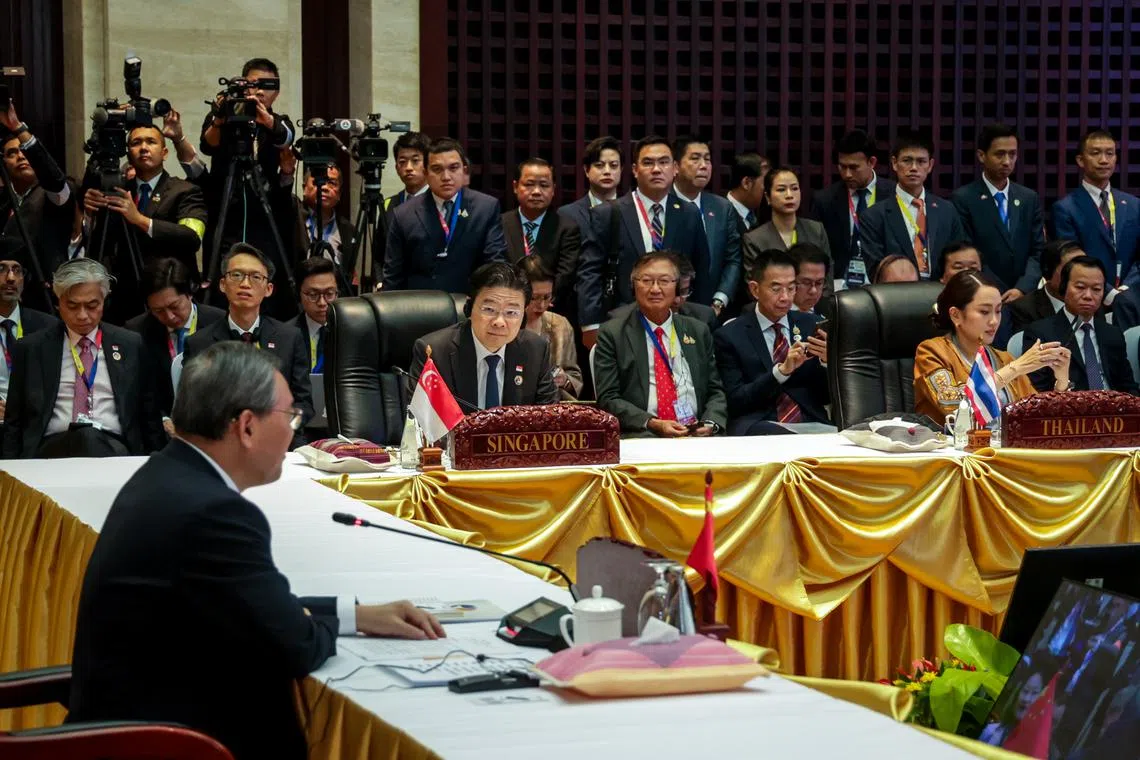Asean and China close to upgrading free trade agreement, covering digital, green economies
Sign up now: Get insights on Asia's fast-moving developments

PM Lawrence Wong listening as Chinese Premier Li Qiang speaks during the 27th Asean-China Summit in Vientiane on Oct 10.
PHOTO: LIANHE ZAOBAO
VIENTIANE, Laos – Negotiations to upgrade the free trade agreement (FTA) between Asean and China have almost concluded after nearly two years, with business-friendly initiatives for firms operating across these markets, leaders of both sides said on Oct 10 during a summit.
The announcement was made at a meeting of Asean and China leaders during the ongoing 44th and 45th Asean Summits and related meetings in Vientiane, Laos.
“This upgrade to the FTA is an important move, especially in this time of growing protectionism in the world. It will send a very clear and important message to everyone on the importance of free trade and win-win market cooperation,” said Singapore Prime Minister Lawrence Wong, addressing his regional counterparts during the 27th Asean-China Summit.
A full conclusion of the negotiations, which include upgrades in the digital and green economies, is targeted for 2025.
Once implemented, the upgraded agreement will, among other things, introduce new and enhanced rules covering Customs procedures, supply chain connectivity, competition and consumer protection, as well as economic and technical cooperation.
This is the second time the trade agreement is to be refreshed since its inception in 2010, with the current round of negotiations starting in 2022, according to Singapore’s Ministry of Trade and Industry, which has been involved in the Asean-China Free Trade Area (ACFTA) discussions.
The ACFTA covers a free trade area of more than two billion people with a combined GDP exceeding US$20 trillion (S$26 trillion). Under the existing agreement signed in 2010, Asean’s trade in goods with China has nearly tripled, from US$235.5 billion in 2010 to US$696.7 billion in 2023.
In 2023, foreign direct investment (FDI) from China to the 10-member grouping amounted to US$17.3 billion, making China Asean’s largest trading partner and third-largest source of FDI.
Describing the Asean-China relationship as one of the grouping’s most substantive and dynamic ones, PM Wong said that establishing a comprehensive strategic partnership with China in 2021 has deepened this relationship further.
He urged closer cooperation between Asean and China in areas that include air transport and climate change as well as the transition to clean energy, noting that China’s expertise can help to advance the region’s plans for the Asean Power Grid.
Asean and China share close bonds that go back centuries, said PM Wong, adding that closer cooperation between the two sides will also build up trust and confidence, and help manage issues that inevitably arise from time to time.
“It is a relationship where countries big or small are treated as equals, and work together on the basis of mutual trust, mutual respect and mutual benefit,” he said.
The annual regional gathering is being held against the backdrop of increasing geopolitical tensions, as well as concerns over rising military conflict in the Middle East, maritime disputes in the South China Sea, the broader US-China rivalry and the continued civil unrest in Myanmar since the 2021 military coup.
PM Wong brought up the example of disputed waters in the South China Sea, which is at the fore of overlapping territorial claims by China, Taiwan and the four Asean member states of Brunei, Malaysia, the Philippines and Vietnam.
He said that Singapore’s consistent position is that all parties should ensure freedom of navigation and overflight, and adhere to international law, including the 1982 United Nations Convention on the Law of the Sea (Unclos). The Unclos sets a comprehensive international legal framework to settle issues over the disputed waterway.
“We look forward to the expeditious conclusion of a Code of Conduct that accords with international law, including Unclos,” said PM Wong, referring to the code that Asean is currently negotiating.



